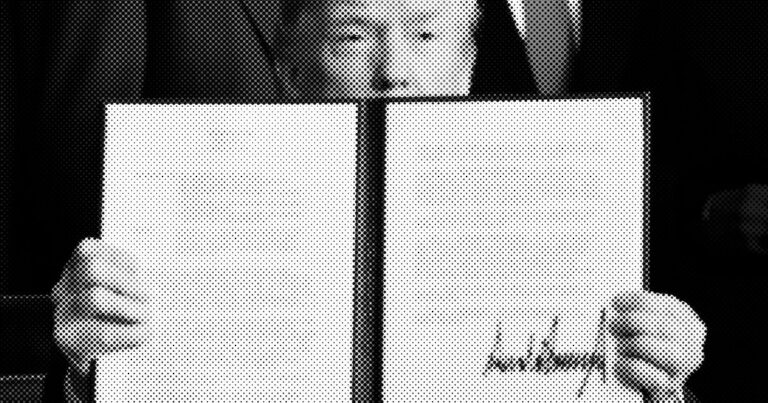One of the most underrated developments during Donald Trump’s presidency is that his China strategy has been a complete failure in itself. Trump began his presidency as a trade warrior hell-bent on ending China’s manufacturing dominance, but ended it as a whining apologist for Beijing.
The culmination of Trump’s standoff with China was a trade deal in which China committed to buying $200 billion worth of U.S. products. Former Trump national security adviser Robert O’Brien acknowledged that the Chinese side didn’t actually live up to the deal. “I don’t think we’re going to get a deal like Phase 1,” O’Brien told Semaphore’s Morgan Chalfant. “I think the public was generally happy with Phase 1, but at the end of the day, the Chinese side didn’t live up to the deal.”
At the time, Trump was trying to tout the trade deal with China as the crowning achievement of his first term. His blistering rhetoric against Beijing was supposed to pave the way for the deal, and he could tout it as ushering in a new era of friendship and prosperity. “One of the many great things about the massive trade deal we just signed with China is that it brings both the US and China closer in so many other ways,” he tweeted. “Great to work with President Xi Jinping, who loves his country so much. More to come!”
The agreement came just as the coronavirus was beginning to spread in China, and President Trump continued to insist in the first weeks of the pandemic that the virus was well under control thanks to the Chinese Communist Party’s flawless and forthright leadership. (“China has worked hard to contain the virus. The United States appreciates their efforts and transparency. Everything will be fine.”)
So O’Brien’s admission that the deal didn’t actually bring him any profit is pretty reprehensible. Of course, there are plenty of former Trump advisers who admit that Trump was a naive, criminal liar, but O’Brien is not a repentant former vassal; he is a current vassal who continues to vie for influence in preparation for a possible second term.
At least some of Trump’s potential advisers seem to have generally sensible ideas about how to design a trade policy with China that would actually work. “Some think Trump might try to assemble an international coalition to limit China’s rise in electric vehicle exports, with an eye toward locking out electric car giant BYD,” Chalfant reports. O’Brien envisions a partnership with allies to isolate China’s strategy to dominate auto export markets.
O’Brien said this time around, Trump is likely to work with allies in Europe and Asia to put more pressure on Chinese companies like BYD.
“BYD is trying to put automakers all over the world out of business by selling cars subsidized by the Chinese Communist Party everywhere,” he said of the Chinese Communist Party. “Japan, South Korea and Germany are starting to wake up to the danger. If China destroys the German auto industry, which could happen quickly, Germany will be in real trouble. So I think we’ll have some common ground with our allies in how we respond to Chinese EVs and battery technology in the future.”
Surrounding China with an economic alliance seems like a smart idea, but the idea that Trump would go along with this strategy seems wildly optimistic. First, the policy he claims he actually wants to follow is likely to be high enough to replace the income tax, currently targeting 10% (an impossible goal, but whatever).
Universal tariffs are the opposite of partnership with allies: they would consolidate the U.S. auto market with its European and Asian partners. Decline, Rather than raising tariffs on these countries,
The second, and more serious, problem with having Trump pursue this strategy is that it goes against his instincts. Trump has been attacking America’s allies as parasites since 1987. As president, he relentlessly denounced them as so-called free riders. He particularly resents Germany’s ability to manufacture automobiles. “Look at how they’re selling millions of cars in America. It’s terrible. We’re going to stop this,” Trump reportedly said at a disastrous NATO meeting.
For almost as long, Trump has been obsessed with the world’s autocracies. Russia is no secret Trump’s centerpiece, but he’s not the only one in his heart. Trump praised the 1990 Tiananmen Square massacre (“They were brutal, they were horrible, but they put it down with force. It shows the power of strength. We are now perceived as weak.”) After assuming the presidency, he continued to praise China’s very strong leadership, congratulating Xi Jinping on becoming president for life and touting his intelligence and strength.
The known way for foreign countries to lure Trump is through a combination of bribery and flattery. Authoritarian states have a natural advantage at this game: They have weak or no laws against corruption, and their leaders can flaunt tiresome friendships with disliked figures like Trump without fear of alienating their domestic supporters.
The idea that Trump would stop provoking America’s allies, forge economic partnerships with them through expanded free trade, and stand up to the world’s most powerful dictatorship sounds like a great plan. All they have to do is get Trump to believe the literal opposite of his deepest beliefs.

